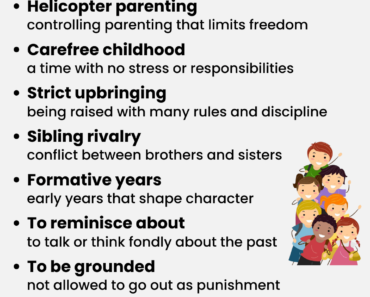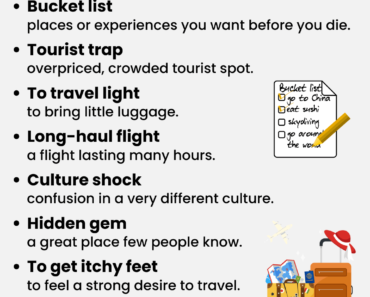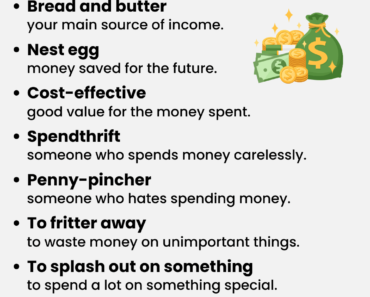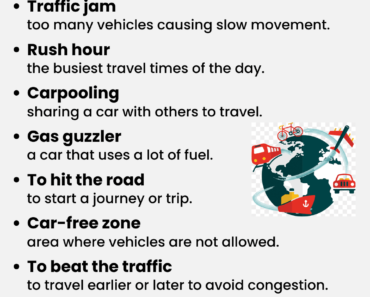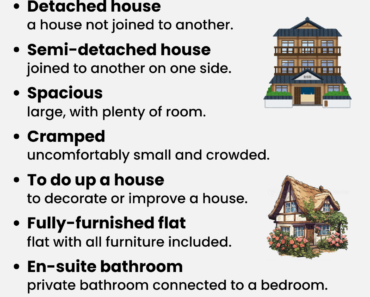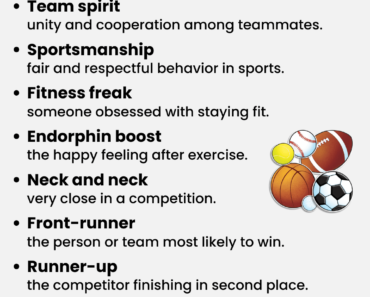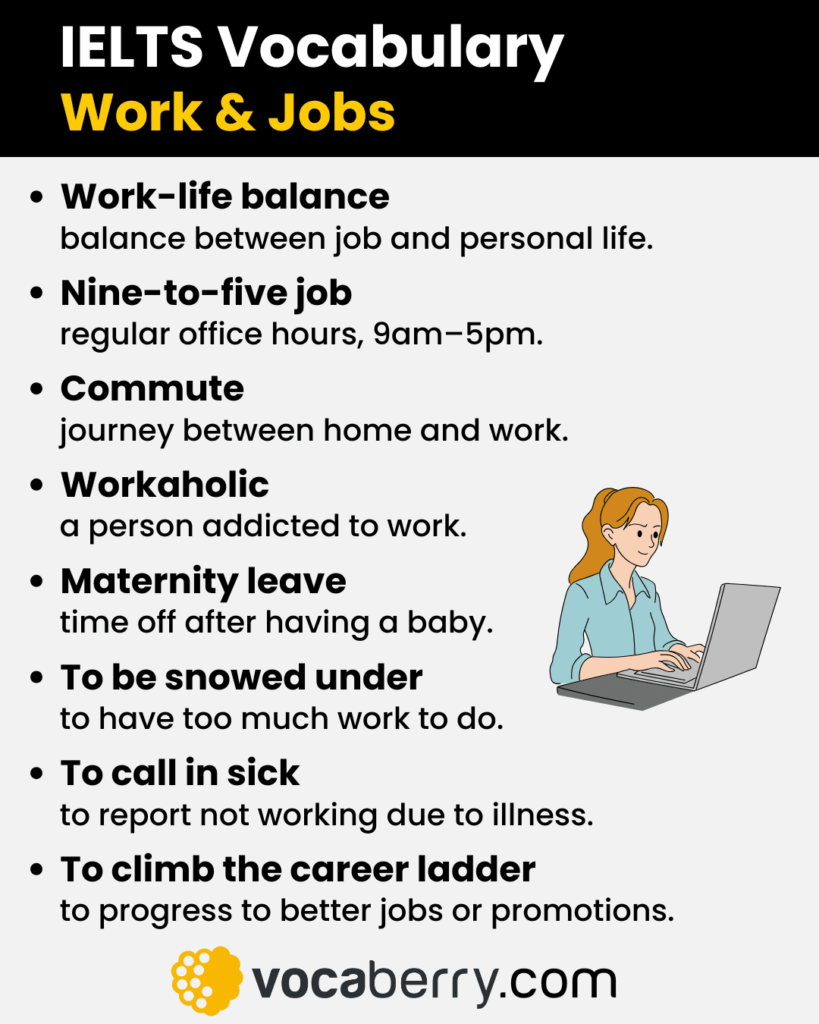
Work and jobs are common topics in the IELTS Speaking test. Examiners may ask you about your current job, daily responsibilities, colleagues, or opinions on issues like work–life balance and career goals. In this guide, you’ll find useful IELTS vocabulary for work and jobs with clear definitions, followed by IELTS Speaking Part 1, Part 2, and Part 3 questions with sample answers.
IELTS Vocabulary for Work & Jobs
Here is some useful IELTS vocabulary for talking about work and jobs with clear definitions. These words and phrases will help you give better answers in the IELTS Speaking test.
- Full-time job – working standard hours (35–40 per week).
- Part-time job – working fewer hours than full-time.
- Freelancer / self-employed – working independently, not for one employer.
- Colleagues / coworkers – people you work with.
- Employee – a person who works for an organisation.
- Employer – a person or organisation that hires workers.
- Work-life balance – balance between job and personal life.
- Job satisfaction – how happy you are with your job.
- Career prospects – chances for promotion and future jobs.
- Flexible working hours – ability to choose when you work.
- Remote working – working outside the office.
- Annual leave – paid days off work each year for holidays or personal time.
- Maternity leave – time off work for a mother after having a baby.
- Paternity leave – time off work for a father after a baby is born.
- Unemployment benefits – money paid to jobless people.
- Notice period – time you must work after resigning.
- Perks of the job – extra benefits apart from salary.
- Benefit in kind – non-cash perk (e.g. insurance).
- Commute – journey between home and work.
- Office politics – conflicts and power struggles at work.
- Demanding job – requires a lot of time or effort.
- Dead-end job – a job with no career growth.
- High-powered job – an important and influential job.
- Steady job – a job with reliable hours and stable income.
- Well-paid job – job with a high salary.
- Poorly-paid job – job with low salary.
- Blue-collar job – manual labour job.
- White-collar job – office-based job.
- Desk job – office job that mainly involves sitting at a desk.
- Manual work – physical labour rather than office work.
- Job security – stability in employment.
- Unemployment – being without work.
- Redundancy – job loss because position isn’t needed.
- Morning/Night shift – working day or night hours.
- Overtime – extra hours worked beyond the schedule.
- Teamwork – working together with others.
- Skills gap – lack of skills for a certain job.
- Soft skills – personal skills like communication, teamwork.
- Hard skills – technical or job-specific abilities.
- Curriculum vitae (CV) – written record of qualifications and work history.
- Networking – building relationships for career opportunities.
- Nine-to-five job – regular office hours, typically 9am–5pm.
- Workaholic – a person addicted to working too much.
- Team player – someone who works well with others.
- High staff turnover – when many employees leave and new ones are hired.
- Glass ceiling – an invisible barrier preventing promotion, often for women.
- Zero-hours contract – a contract with no guaranteed working hours.
- Job-hopping – moving frequently from one job to another.
- On-the-job training – learning while working.
- Side hustle – extra job for additional income.
- Sick leave – time off when ill.
- Dream job – the ideal job you’d love to have.
- Corporate culture – the values, attitudes, and style of a company.
- In the rat race – competitive struggle of work life.
- Working like a dog – working extremely hard.
- Heavy workload – having too much work to do.
- Workplace harassment – unfair treatment or bullying at work.
- Workplace diversity – including people from different backgrounds.
- Work ethic – attitude towards hard work and responsibility.
- To call in sick – to notify your workplace you’re unwell and can’t work.
- Probation period – trial period before being officially confirmed in a job.
- Performance review – an evaluation of your work by your employer.
- Job hunting – the activity of looking for a job.
- To earn a living – to make money to support yourself.
- To get promoted – to move to a higher position.
- To burn out – to become exhausted from overwork.
- To work from home – to do your job remotely.
- To land a job – to successfully get a job.
- To meet a deadline – to finish work on time.
- To hand in your notice – to formally quit a job.
- To switch careers – to change your type of job completely.
- To take early retirement – to stop working before the usual retirement age.
- To be made redundant – to lose your job because it’s no longer needed.
- To put into practice – to use skills or knowledge in real-life situations.
- To gain experience – to learn skills and knowledge through work.
- To climb the career ladder – to move up to better jobs over time.
- To be snowed under – to have too much work to do.
- To be called for an interview – invited to a job interview.
- To be stuck behind a desk – office work with little variety.
- To throw a sickie – pretend to be ill to skip work.
- To be laid off – to lose your job due to company downsizing.
- To think on your feet – make quick decisions.
- To get the sack – to be fired from a job.
- To do a job-share – two people sharing one job.
- To pull your weight – to do your fair share of work
- To multitask – to do several tasks at the same time.
IELTS Speaking: Work & Jobs Questions & Answers
In this section, you’ll find IELTS Speaking Part 1, Part 2, and Part 3 questions on work and jobs with sample answers. These examples demonstrate how to use the work and jobs vocabulary naturally in your responses during the test.
IELTS Speaking Part 1 – Work & Jobs
Do you work or are you a student?
I have a full-time job in a small company. I enjoy working with my colleagues, and the role gives me decent work–life balance most weeks.
Do you like your job?
Yes, my job satisfaction is quite high because the tasks are varied and there are a few perks of the job, like training and a travel allowance. The commute is short, which helps me keep my work–life balance.
Do you ever work from home?
Yes, I work from home two days a week. It saves me the commute and lets me multitask small admin jobs between meetings, though I still prefer the office for teamwork.
Do you prefer working alone or in a team?
I like both, but I’m more of a team player. In a group, everyone has to pull their weight, and good teamwork usually leads to better ideas.
What’s the most challenging part of your job?
At times the heavy workload makes it tough to meet a deadline, and you need to think on your feet when problems pop up. If that goes on for too long, people can burn out, so I try to pace myself.
Do you plan to change your job in the future?
Maybe. I’d like to climb the career ladder and eventually get promoted, either here or elsewhere. If the career prospects don’t improve, I might switch careers after gaining more experience.
IELTS Speaking Part 2 – Work & Jobs Cue Card
Describe a job you would like to have in the future.
You should say:
- what the job is
- what skills are needed
- why you would like to do this job
- and explain how it would affect your life.
Sample Answer:
One job I’d really like to have in the future is a well-paid job as a project manager in an international company. I think it would be exciting because the role involves teamwork, problem-solving, and the chance to climb the career ladder quite quickly if you perform well.
To do this kind of job, you need both hard skills, like project management software, and strong soft skills, such as communication and leadership. You also need to be able to think on your feet, especially when deadlines are tight or when there’s a heavy workload. Sometimes projects can be stressful, but I believe I could manage the workload pressure if I planned carefully and relied on my team to pull their weight.
I’d also like this job because of the career prospects. Instead of being stuck in a dead-end job, I’d have the chance to move up the career ladder, get international experience, and maybe even a chance to work with people from diverse cultures, which adds to the corporate culture of global companies.
Another reason is the balance it could bring. Of course, there would be overtime sometimes, but many international firms offer flexible working hours or the option to work from home. That would help me keep a healthier work–life balance, unlike some jobs where you’re stuck behind a desk from nine to five every day.
Overall, having this job would give me both financial security and personal satisfaction. I’d be able to earn a living, support my family comfortably, and still avoid being trapped in the rat race. That’s why I see this role as my future dream job.
IELTS Speaking Part 3 – Work & Jobs Discussion
IELTS Speaking Part 3 questions about work and jobs often ask you to compare different types of employment, discuss how work influences lifestyle and society, and give opinions on issues such as job satisfaction, workplace culture, and future career opportunities.
What do you think makes a job satisfying?
I think job satisfaction comes from a combination of factors. A well-paid job is important because people need to earn a living, but money isn’t everything. Having good career prospects and the chance to climb the career ladder also makes people more motivated. Personally, I believe a positive corporate culture, supportive colleagues, and fair workload pressure are just as essential. If you’re always snowed under with tasks or stuck in a dead-end job, it’s hard to feel satisfied no matter how much you earn.
Do you think people work too many hours these days?
Yes, in many countries people work far too much. A lot of employees end up doing constant overtime or even working in the gig economy, where the hours are irregular and unstable. Some people even become workaholics, which damages their health and family life. Ideally, companies should offer flexible working hours or allow staff to work from home so that they can maintain a better work–life balance. Without this balance, even the most high-powered jobs can quickly lead to burnout.
How has technology changed the way people work?
Technology has completely transformed work. These days, many companies offer remote working, which means people can avoid long commutes and even collaborate internationally. Online platforms also make it easier for freelancers to find opportunities. However, the downside is that technology sometimes blurs the line between work and personal life. For example, emails and deadlines follow you home, so people may feel under pressure all the time. Still, tools like project management apps or even on-the-job training videos have made workplaces more efficient.
Do you think job security is important for workers?
Definitely. Job security gives people peace of mind because they don’t have to worry about being made redundant or suddenly losing their income. A steady job with reliable hours and benefits like annual leave or sick leave is much less stressful than a zero-hours contract, where you never know if you’ll have enough work. Without job stability, people might struggle financially and even hesitate to start families. That’s why I think governments should also provide proper unemployment benefits to support people between jobs.
What kinds of jobs do you think will be important in the future?
I think in the future, jobs related to technology, healthcare, and renewable energy will be in high demand. For example, IT specialists already enjoy excellent career prospects, and this trend will continue. At the same time, healthcare roles are usually demanding jobs with a heavy workload, but they’re essential for society. I also believe there will be more opportunities for people to have a side hustle or even take part in the gig economy, as flexible work becomes more common. The challenge will be to make sure these new jobs still offer a decent work–life balance and not just financial rewards.
More IELTS Vocabulary Topics
If you found this lesson useful, explore other IELTS Speaking topics to expand your vocabulary and practice with sample answers:
- IELTS Vocabulary: Accommodation
- IELTS Vocabulary: Advertisement
- IELTS Vocabulary: Animals
- IELTS Vocabulary: Art
- IELTS Vocabulary: Artificial Intelligence
- IELTS Vocabulary: Books
- IELTS Vocabulary: Childhood
- IELTS Vocabulary: Crime and Punishment
- IELTS Vocabulary: Culture and Traditions
- IELTS Vocabulary: Daily Routine
- IELTS Vocabulary: Education
- IELTS Vocabulary: Environment
- IELTS Vocabulary: Family
- IELTS Vocabulary: Fashion and Clothes
- IELTS Vocabulary: Films
- IELTS Vocabulary: Food & Diet
- IELTS Vocabulary: Friends
- IELTS Vocabulary: Gifts
- IELTS Vocabulary: Health
- IELTS Vocabulary: Hobbies
- IELTS Vocabulary: Hometown
- IELTS Vocabulary: Money
- IELTS Vocabulary: Museums
- IELTS Vocabulary: Music
- IELTS Vocabulary: Plants
- IELTS Vocabulary: Shopping
- IELTS Vocabulary: Social Media
- IELTS Vocabulary: Sports
- IELTS Vocabulary: Technology
- IELTS Vocabulary: Transport
- IELTS Vocabulary: Travel
- IELTS Vocabulary: Weather

